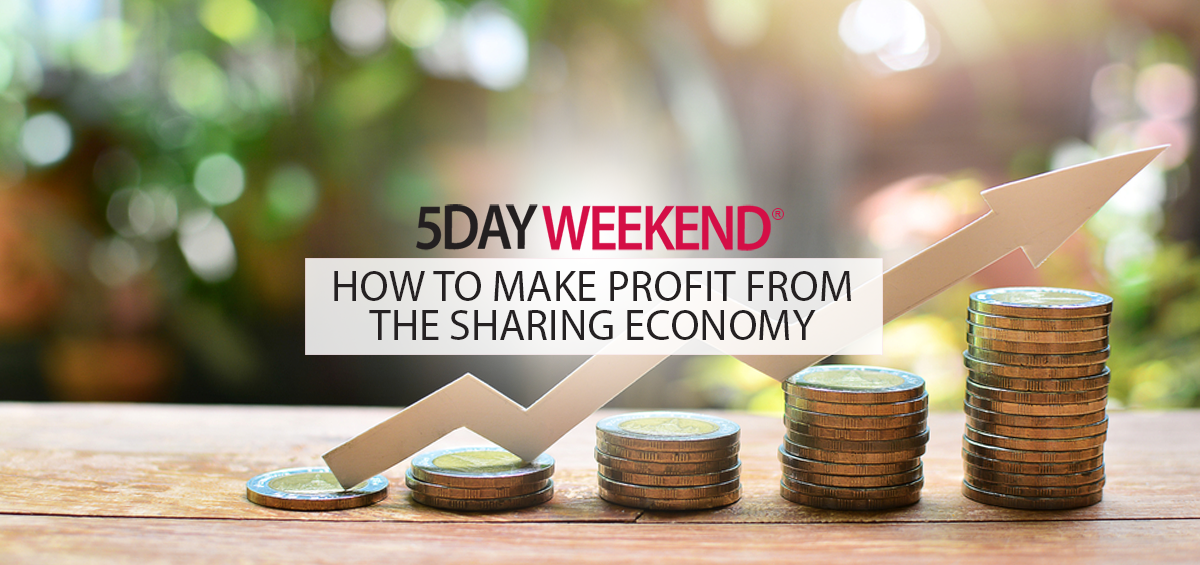The sharing economy, also referred to as collaborative consumption, refers to people sharing access to goods and services, and coordinating the sharing via community-based online services.
In this new model, people rent beds, cars, boats and other assets directly from each other instead of owning things themselves or purchasing them from traditional retailers and service companies. Just as Amazon allows anyone to become a retailer, sharing services let people act as a taxi service or hotel. At the time of writing this, the consumer peer-to-peer rental market is valued at $26 billion.
Harvard Business Review argues that the term “sharing economy” is a misnomer and that a more accurate term for it is “access economy.” We won’t split hairs. The point we want to make is that this new technology-facilitated model is a simple and great way to leverage your existing assets to earn extra money on the side.
Here are just a few examples of ways you can use the sharing economy to boost your income:
Airbnb

Airbnb allows you to rent a room or your whole home to travelers, thus earning supplemental income with existing assets. In just over seven years, Airbnb has become a $25.5 billion company with more than 2 million listings across 190+ countries.
There are many things to consider before starting an Airbnb service, including municipal laws (many cities don’t allow it); competing rates in your area; and the costs of hosting, such as cleaning, higher utility bills, taxes, and Airbnb’s payment processing fee (6 to 12%). Your listing will be displayed on Airbnb’s website, and you can also cross-promote it using any free social media platforms or your own website.
Airbnb arbitrage is the process of renting out a property that you do not own but rent for yourself. An arbitrage opportunity exists where you generate more money renting out the property on Airbnb, then what it costs you to rent from the landlord, providing you free rental status. If you want to rent on Airbnb, but have a landlord, approach him or her and get permission to rent out the space. Offer your landlord something on the income side, perhaps a at rate or a percentage of all Airbnb earnings on the property.
One of Garrett’s clients, Demi, was a single mom and yoga instructor. She heard about Airbnb and started renting out two bedrooms in her personal residence. She generated enough cash flow from those bedrooms that she was able to buy another home, move out, and then rent out the whole house. She now earns be- tween $1,000 and $1,800 a month from her Airbnb property.
Uber, Lyft and Others

A ride-sharing service allows you to give or find rides from regular people who have a car, instead of paying for a taxi. You can save money by commuting with someone else, or earn money by driving someone else. You earn money on your schedule. You drive when you want and earn as much as you want, with the potential to make great money. Thirty hours of driving per week can generate up to $1,000 on average. You get paid weekly and your fares are automatically deposited. Additionally, this is a unique way to monetize your car, especially if you have a car loan. You could buy a new car and pay it off as an Uber driver.
In late 2016 I was visiting London to deliver a keynote address. I had an Uber driver pick me up, and we struck up a conversation. He was a refugee from Afghanistan. He was generating $6,000 U.S. per month as an Uber driver. I asked him if he owned the Toyota Prius he was driving. He said, “No.”
I dug deeper and learned that he and 19 of his other refugee friends, who had arrived within the previous four months, were all Uber drivers. They were renting their cars from another Afghan refugee who had arrived in London four years before them. These 20 Afghan drivers arrived in London with no money to buy a car. Yet now they’re each generating an average $4,000 per month net after all costs.
The man who financed the cars paid an average of $24,000 for each car. He rents them out at $1,800 per month each, which generates $21,600 per month ($259,200 per year) in net revenues on 20 cars. He pays for all registration, insurance, maintenance, and fuel costs. The drivers simply trade their time and drive, and generate about $4,000 per month net after their rental fee. For these drivers, $7,000 can support their families for an entire year back in Afghanistan. His plan is to upgrade his fleet to 50 cars. There are 30 other refugees on the waiting list to take up his offer.
Poshmark
People buy or sell their clothing via Poshmark’s mobile app. The premise is that you can “make money from clothes that are just sitting in your closet.”
Fon
Fon enables people to share their home wi-fi network in ex- change for getting free wi-fi from other users in the network.
TaskRabbit and Zaarly
These mobile marketplaces allow you to hire people to do jobs and tasks, from delivery, to handyman to office help. You can use these platforms to market your own services, from home repairs to iPhone repairs.
DogVacay
Dog owners can leave their dog with a host who will take care of the dog. Love dogs? Become a host and earn some money doing something you love.
Spinlister
Spinlister allows you to rent a bike from or to a neighbor.
Lending Club

Lending Club is a peer-to-peer network for lending and borrowing cash. It’s cheaper than credit cards for borrowers and provides better interest rates than savings accounts for investors.
In my next post, I’ll offer a few other tips on finding online opportunities to increase your income.
In the meantime, I’d love to hear about your experiences – have you sampled or offered any of these services I just listed? What did you think? Thank you for sharing.
Secure your copy of the “5 Day Weekend” book. 5 Day Weekend: Freedom to Make Your Life and Work Rich with Purpose [Nik Halik & Garrett Gunderson]
















Leave a Comment